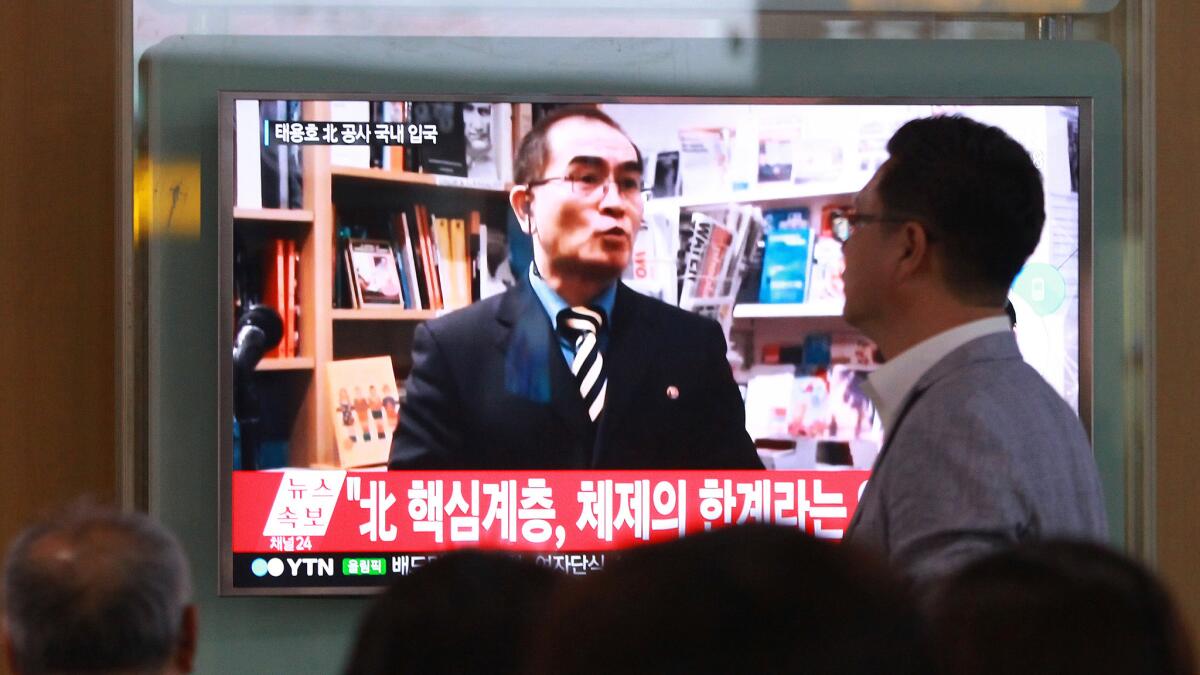Rarely subtle in criticisms, North Korea heaps scorn on diplomat defector

- Share via
Reporting from SEOUL — North Korea is rarely accused of being subtle in its criticisms, and has trotted out one its harshest epithets for a diplomat who recently defected to South Korea.
Thae Yong Ho, a high-ranking diplomat who fled the North’s embassy in London, is “human scum,” the official Korean Central News Agency said Saturday.
Thae also was accused of sexual assaulting a minor, and of being a traitor “who lacks even an elementary level of loyalty and even tiny bits of conscience and morality that are required for human beings.”
North Korea’s state media often carry nasty invective about figures who publicly criticize or defy the government in Pyongyang. They have in the past used racist and sexist language to refer to President Obama and South Korean President Park Geun-hye, respectively.
In announcing Thae’s defection, the South Korean government said in recent days that Thae was “sick and tired” of North Korea’s leadership, and that he admired the comparatively robust civil liberties that would be available to him and his family in South Korea. Thae defected to the South with his wife and children, the South Korean government said, though it did not disclose the timing or route of his defection.
Thae’s public defection to South Korea is a blow to the public image of North Korea, and a victory for the South in the long battle between South and North to present themselves internationally as the more desirable of the two Koreas.
Despite Thae’s defection, and that of a group of 13 North Korean restaurant workers from China to South Korea in April, there are no signs that leader Kim Jong Un’s government is in danger of losing its grip on power at home, analysts have said.
While more than 1,000 North Koreans arrive in the South every year, and more than 29,000 are registered here, defections by overseas diplomats and government officials are rare. The most high-profile case came in 1997 when Hwang Jang Yop, a close associate of founding leader Kim Il Sung, defected to the South.
Relations between South and North are at one of their frostiest points ever, with all economic cooperation projects having been shut down, Seoul objecting to North Korea’s nuclear and missile tests, and Pyongyang expressing displeasure over Seoul’s recent decision to deploy the Terminal High Altitude Area Defense, or THAAD, antimissile system. The system is meant to intercept North Korean missiles before they can hit South Korean territory.
It is possible that Thae’s defection could inspire other high-ranking North Koreans posted abroad to abscond, and could push the government to further tighten its controls and surveillance of citizens overseas, said a report on the website of the Center for Strategic and International Studies.
“This latest defection will also likely cause Kim Jong-un to crack down even further on defections from North Korea,” the report said.
Borowiec is a special correspondent.
ALSO
How to track poverty from space
26 overdoses in just hours: A small West Virginia city faces its demons
Amid Milwaukee unrest, a controversial black sheriff clashes with the city’s white police chief
UPDATES:
3:50 p.m.: This article has been updated with Times reporting.
This article was originally published at 3:10 a.m.
More to Read
Sign up for Essential California
The most important California stories and recommendations in your inbox every morning.
You may occasionally receive promotional content from the Los Angeles Times.









